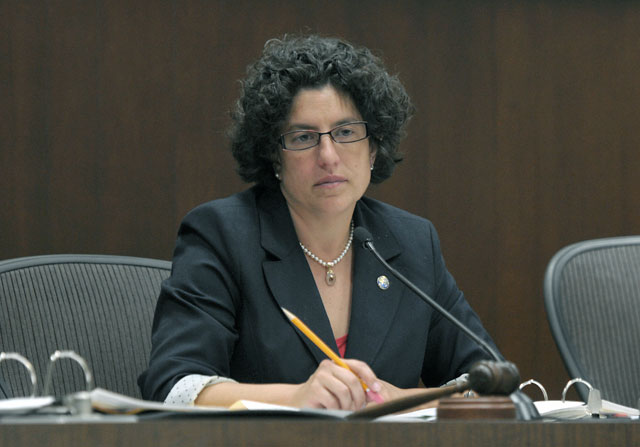Mayor Takes It On Chin
Democrats, Unions, and Educators Not Happy with Initiative Package

The Democratic Central Committee has asked Santa Barbara’s Democratic mayor, Helene Schneider, to withdraw her ambitious package of ballot initiatives that combined, the mayor says, could ease City Hall’s budget burden to the tune of $8 million a year. Most objectionable to the group was the initiative that would require public employees to pay the maximum employee contribution to their pensions allowed by law. Traditionally, retirement benefits are hashed out at the bargaining table. Longtime party activist Mickey Flacks said she would have expected such an “anti-labor” proposal to come from Wisconsin’s union-busting governor Scott Walker, but not a solid liberal Democrat like Schneider.
Schneider, who did not attend the meeting due to a prior personal commitment, said she found it “dispiriting things got so vitriolic.” But Tony Pighetti, president of the city firefighters’ union, disputed that Schneider — whom the union has endorsed in the past — is “anti-union.” He did express serious concern, however, that her pension initiative was “anti-labor” and said that it set a bad precedent. “What’s next, an election on what health benefits we should get? What our salary should be?” he asked.
Pighetti added that the firefighters have proven more than accommodating in response to City Hall’s budget woes, agreeing mid-contract to concessions that helped keep one of the fire stations from being blacked out. (If police and firefighters paid the maximum employee contribution to their retirements, it would cost them on average $8,000 a year, saving City Hall roughly $2 million annually. City workers represented by the Service Employees International Union already pay their maximum contribution.)
Schneider said she understood that including some version of pension reform in her package would prove “provocative” to many die-hard Democrats, but said she’s been applauded by some longtime progressives for including it. Public antipathy toward public employee retirement is mounting, she warned, and there are far more draconian reforms under discussion. “I understand there’s something for everyone to dislike in this package, but taken as a whole, it will bring great dividends to the city,” she said. “If everyone just sticks to the status quo, we won’t solve anything.”
When Schneider first unveiled her plan on February 7, it included four separate measures slated for the November election: one to increase the sales tax by half a cent, which would generate $10 million a year; one to split the proceeds of that with the Santa Barbara Unified School District; the pension reform provision; and a quarter percent increase on the business tax charged to downtown bar owners. By including the schools and pension reform — and both would have to pass for one to fly — Schneider hoped to unify tax-and-spend liberals with cost-cutting conservatives.
But in response to heated and immediate criticism from the Santa Barbara Education Foundation, Schneider agreed to drop the initiative to split the sales tax increase with the schools, which is only advisory. The Education Foundation is pushing two parcel tax measures for the June ballot which will generate $3.5 million a year for four years, and its members worried that the presence of another school-related tax, even if in November, could cost them crucial votes. They were also angry that Schneider — who’d kept the details of her package an exceptionally well-guarded secret until the last minute — had failed to consult with them. Schneider said she remains committed to splitting the increased sales taxes with the schools, but instead of collecting signatures now, will ask her fellow city councilmembers to place an advisory ballot measure before voters in November.
To date, Schneider’s gambit, however creative and bold, has attracted more criticism than praise from Santa Barbara’s established political players. Leaders of the teachers union and the retired teachers union — who presumably would want the $5 million Schneider is offering in educational funding — are leery. While the Police Officers Association — like the firefighters — has not yet officially weighed in, its leaders are stunned and apoplectic. Anti-tax crusader Lanny Ebenstein, now pushing a statewide plan to outright ban collective bargaining by public employee unions, complained Schneider’s plan had not been properly vetted. Ironically, Schnieder’s most enthusiastic supporter to date has been Santa Barbara Councilmember Frank Hotchkiss, a conservative Republican often at odds with the mayor’s positions.



